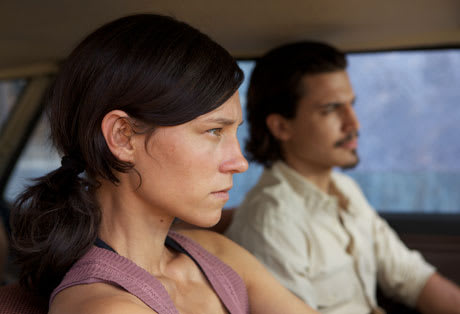Near the beginning of European immigration drama Colour of the Ocean, Nathalie (Sabine Timoteo), a German tourist in the Canary Islands, happens upon a landed boat full of African refugees – some dead, some on the cusp – desperate for water.
Having only a small portion of bottled water in her beach bag, she offers it to the young, unconscious Mamadou (Dami Adeeri), whose father, Zola (Hubert Koundé), is looking for help. Returning to her posh vacation lifestyle after the authorities get a handle on the situation, she receives an unexpected phone call from Zola after he escapes from a refugee compound and needs someone to help him.
Mixed in with this ethical character drama of happenstance is the story of José (Álex González) – the officer interrogating the landed refugees, trying to determine if they're from Senegal or the Congo – whose rage towards the immigrants may have something to do with his drug addicted sister.
Throughout the film, there are hints at political discussions, such as the raping of world fish reserves leading to unemployment and poverty in certain African countries. We're given all angles, even though the dominant one tends to be of liberal ideals, painting Zola and his son as caricatures of purity and grace.
And while this obvious stance is mildly aggravating, it doesn't necessarily detract from a story that is smartly complex and character-driven, considering the angles and reactions of those involved and how this crossing of paths might change their perspective on things. There's even a hint that the act of giving could prove problematic in a situation not easily resolved with mere cash.
This occasional ambivalence, mixed with intense and convincing performances all around, manages to elevate this standard political ploy to something affecting and thought-provoking.
Even though Nathalie's "change" is somewhat glib – her learning how arbitrary her quotidian struggles were – it's hard not to get wrapped up in the central drama involving Zola and his son.
(Starhaus)Having only a small portion of bottled water in her beach bag, she offers it to the young, unconscious Mamadou (Dami Adeeri), whose father, Zola (Hubert Koundé), is looking for help. Returning to her posh vacation lifestyle after the authorities get a handle on the situation, she receives an unexpected phone call from Zola after he escapes from a refugee compound and needs someone to help him.
Mixed in with this ethical character drama of happenstance is the story of José (Álex González) – the officer interrogating the landed refugees, trying to determine if they're from Senegal or the Congo – whose rage towards the immigrants may have something to do with his drug addicted sister.
Throughout the film, there are hints at political discussions, such as the raping of world fish reserves leading to unemployment and poverty in certain African countries. We're given all angles, even though the dominant one tends to be of liberal ideals, painting Zola and his son as caricatures of purity and grace.
And while this obvious stance is mildly aggravating, it doesn't necessarily detract from a story that is smartly complex and character-driven, considering the angles and reactions of those involved and how this crossing of paths might change their perspective on things. There's even a hint that the act of giving could prove problematic in a situation not easily resolved with mere cash.
This occasional ambivalence, mixed with intense and convincing performances all around, manages to elevate this standard political ploy to something affecting and thought-provoking.
Even though Nathalie's "change" is somewhat glib – her learning how arbitrary her quotidian struggles were – it's hard not to get wrapped up in the central drama involving Zola and his son.
